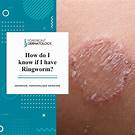How Do You Know If Your Pet Has Ringworm?
Ringworm is a common fungal infection that can affect both humans and animals. In pets, ringworm is typically caused by a fungus called Microsporum canis. Ringworm can cause a variety of skin problems, including itchy, red, and scaly patches of skin. In some cases, ringworm can also lead to hair loss.

Symptoms of Ringworm in Pets
The most common symptom of ringworm in pets is the appearance of one or more circular, red, and scaly patches of skin. These patches may be slightly raised and may have a crusty or flaky appearance. They are often itchy and may cause your pet to scratch or lick the area excessively.
Other symptoms of ringworm in pets include:
- Hair loss in the affected area
- Brittle or broken hair
- Scaly skin
- Itchy skin
- Redness or inflammation of the skin
- Lethargy
- Weight loss
How is Ringworm Diagnosed?
Ringworm is diagnosed by a veterinarian. The veterinarian will examine your pet's skin and may take a skin scraping or culture to confirm the diagnosis. A skin scraping is a simple procedure in which the veterinarian uses a scalpel or other sharp instrument to scrape a small sample of skin from the affected area. A skin culture is a laboratory test in which a sample of skin is placed in a special container and incubated for several days. If the fungus that causes ringworm is present, it will grow in the culture.
Treatment for Ringworm in Pets
Ringworm is treated with antifungal medication. The type of medication that is used will depend on the severity of the infection. In some cases, topical antifungal medication may be sufficient. In other cases, oral antifungal medication may be necessary. Treatment typically lasts for several weeks.
Preventing Ringworm in Pets
There is no surefire way to prevent ringworm in pets, but there are a few things you can do to reduce the risk:
- Keep your pet away from other animals that are known to have ringworm.
- Wash your hands thoroughly after handling an animal that is known to have ringworm.
- Clean and disinfect your pet's bedding and other belongings regularly.
- Keep your pet's nails trimmed short to reduce the risk of scratching.
Conclusion
Ringworm is a common fungal infection that can affect both humans and animals. It is important to be aware of the symptoms of ringworm in pets so that you can seek veterinary care promptly. With early diagnosis and treatment, ringworm can be successfully treated.
Declaration: All article resources on this website, unless otherwise specified or labeled, are collected from online resources. If the content on this website infringes on the legitimate rights and interests of the original author, you can contact this website to delete it.




